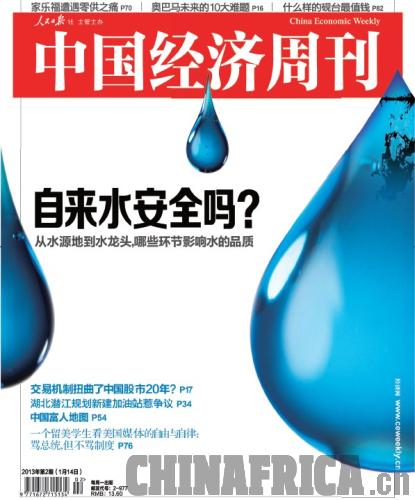| 
Water Safety
China Economic Weekly
January 14, 2013
The safety of drinking water is vital to everyone's health. China Economic Weekly looks at potential hazards that may threaten the safety of drinking water from headwaters to domestic taps.
Experts believe that the water at the source is not as clean as authorities claim. In north China, water shortage has always been a problem and water is further polluted due to overexploitation on underground water, which increases its nitrate content. In the south, rivers are used for aquiculture. Proteins in aquatic feeds accumulate and cause too much nitrogen and phosphorus release in the water.
Besides, fund shortages restricts technological breakthroughs on filtrating and disinfecting water and upgrading current aging water supply pipeline networks. Experts call for a reform on the management of drinking water supplies, with government supervising and companies running the water processing.

Improving Welfare
Oriental Outlook
January 3, 2013
Oriental Outlook in this issue looks at a report of the corporate benefits of Chinese employees released in December 2012. Based on the first nationwide investigation into employee benefits, which involved 4,356 companies across 64 cities, the report concluded that the corporate employee benefit index in China was 65.35, indicating a quite low level.
Comparatively, foreign companies offered the best benefit, followed by state-owned companies; private companies, mostly small- and medium-sized enterprises (SMEs), offered the worst. Experts believed employees hoped to improve benefits closely related to their livelihood, including pensions, medical care and housing.
SMEs are now absorbing a large number of China's workforce and will be the mainstream of China's future enterprises. To upgrade the nation's overall benefit, Yuan Yue, Chairman of Horizon Research Consultancy Group, one of the compilers of the report, suggested that besides the government releasing favorable SME policies, the state-owned companies should offer funds and support SMEs to establish a benefit system covering as many employees as possible.
Student Facilities
The Economic Observer
January 7, 2013
Primary and secondary school students in Wuchuan, a city in south China's Guangdong Province, are required to bring their own desks and chairs to schools for class.
The area, among China's first to open up to the outside world, is regarded as both rich and prosperous. However, to the public's surprise, in such a place, students have to bring their own desks and chairs to schools.
Some principals said that because schools can only provide old desks and chairs, parents prefer to buy their own, allowing kids to use their personal sets from primary through to middle school. This explanation lacks credibility, because if schools had good quality desks, would students still have to provide their own?

Medical Breakthroughs
Southern Metropolis Weekly
January 7, 2013
In this issue, Southern Metropolis Weekly looks back on the medical breakthroughs made in 2012. Although many of these haven't been applied into mainstream medical practice, they portend new hope for defeating fatal diseases.
Researchers at the Ontario Cancer Institute at Princess Margaret Hospital in Toronto found that some cells, which can stimulate the growth of cancer cells, can be dormant during chemotherapy and radiation treatment, thereby avoiding destruction. Such cells wake up when treatment ends, driving the wild multiplication of cancer cells. If the cells could be woken sooner, cancer could become a thing of the past.
Gilead Sciences Inc., based in the United States, developed a new medicine called Truvada by mixing the two traditional antiviral medicines Viread and Emtriva. Scientists found it can restrain the development of HIV. Research has found that the medicine could reduce the risk of contracting HIV by 42 to 75 percent.
Cyber Protection Law
China Youth Daily
January 3, 2013
Recently, the Standing Committee of the National People's Congress passed a legal decision on the protection of private online information. It targets the abuse of personal information to ensure a safe online environment for Internet users.
The law comes at the very time that it is needed. It offers network operators legal support in protecting personal information. The obligations and rights of organizations and individuals related to personal information have been clearly expounded.
Both online shops and consumers can expect safer online transactions. In the long run, this decision is only a start. To ensure long-term development and prosperity, more such laws are needed.
|